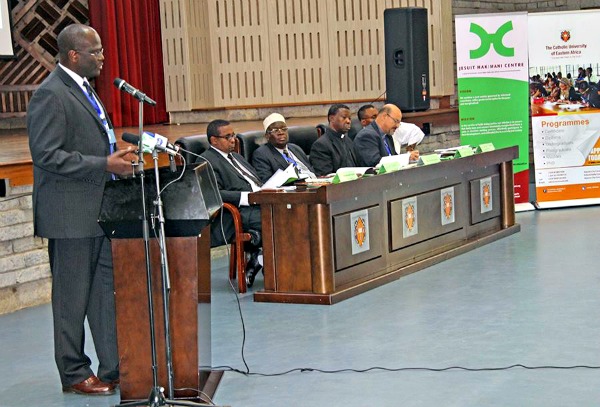
Dr Elias Mokua SJ, Executive Director of Jesuit Hakimani Centre in Nairobi, Kenya
Dr Elias Mokua, Director of the Jesuit Hakimani Centre in Nairobi, Kenya, shares his insights about the country’s recent Presidential election, which was annulled by the Supreme Court among allegations of “irregularities and illegalities”. He remains hopeful that despite tensions in the country, peace will prevail.
Effects of the Election Nullification
First, there are millions of the incumbent’s supporters who are deeply hurting following the ruling. This is because, they did not expect that the Supreme Court will actually annul the election given the high stakes involved. While it is expected the supporters will turn out in large numbers to affirm what they consider was their sweet victory, it is not clear how, should it happen, they will react in the event the incumbent loses the rerun. The hurt might turn into violence if the incumbent and his team do not gracefully concede defeat.
Second, a loss for the opposition is less likely to cause any violence. The opposition supporters will equally hurt but their chances of turning violent are minimal given the government security has been rehearsing to stop violence for the last one and half years going by the government pronouncements.
Third, obviously it is going to be another long 40 days of intense but also tense campaigning. The problem is the campaigns divide the country into hostile camps some of them based on tribal stereotyping and tagging. In this regard, the incumbent is not helping with the negative way in which he has continually expressed disappointment over the Supreme Court ruling. He has attacked the Supreme Court judges using a very condescending language provoking tribal reactions defending the judges. For instance, some leaders from Kisii have claimed the verbal attacks by the President and his deputy on the Chief Justice are an attack on the Kisii people, a tribe the Supreme Court head comes from. ‘The tribe’ will defend their son – so the leaders say.
Fourth, from a justice and conflict prevention perspective (not necessarily by law), I think the ruling brings with it perhaps unintended positives. The supporters of the opposition hurtfully felt the electoral process was marred with so much glaring irregularities that the position taken by the international observers was only cementing the belief that there is no need to seek justice in the courts. Our courts have always been seen as serving the powerful but the ruling has challenged this. So there is a great sense, among many, that finally the judicial process is worthy following if one feels aggrieved. While the loss of the case for the president and his supporters is a bitter experience it nevertheless evens the extreme “ political fundamentalist-like feelings” of both joy (for the camp that thought they had won the election) and sadness (for the opposition). Camps in extreme antagonistic positions can easily degenerate into deadly violence at a slight trigger.
Nevertheless, we remain hopeful all shall be well!
Author: Dr Elias Mokua, Director of the Jesuit Hakimani Centre in Nairobi, Kenya. September 2017
[Notes]
The Jesuit Hakimani Centre works to promote the study and action on issues linking faith, justice and peace in the Jesuit Eastern Africa Province and provides a more visible expression of the social justice dimension of the Jesuits’ identity and mission. The name HAKIMANI conflates three Kiswahili concepts: HAKI (justice), IMANI (faith), and AMANI (peace).

